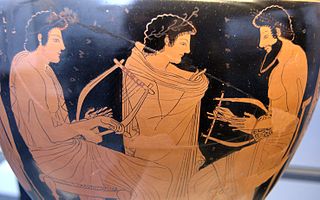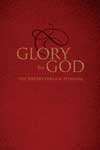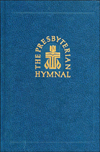Singing Hymns

Since the ability to record sounds is less than a hundred and fifty years old and musical notation did not come into being until only about a thousand years ago, we have only a few clues of how early music would have sounded. Many pieces of poetry have survived from very ancient times; many references to singing come to us from ancient Sumerian tablets; and even a few musical instruments have been discovered in Egyptian tombs. Several Vedic hymns transmitted orally by Brahmin priests in India date to before the time of Moses, and some Byzantine chants used among Eastern Orthodox monastic orders have been orally transmitted since at least the Fifth Century. But those are exceptions. We don't know how most music would have sounded much before the Ninth Century when musical notation was developed. What we do know is that among the earliest writings anywhere in the world we have hymns. They were written to praise, to pray, and to worship as God was understood among those persons at that time.
Scripture divides religious music into psalms, hymns and spiritual songs (Ephesians 5:19 and Colossians 3:16). There is not universal agreement of what makes a song fit in one category or another. For our purposes we will assume that:
Psalms are those songs included in the Old Testament book of Psalms. Some people include any setting of Scripture to music in this category.
Hymns are those songs written to express theological and communal understanding of God's attributes or actions. Hymns do not refer back to the singer but are sung to God. They are more universal and timeless than spiritual songs.
Spiritual songs are those songs which are written to address the spiritual experience of a specific person, time, and place. They are more likely to refer specifically to the singer or to the intended audience.
Singing and Worship
In the Fifth Century in his Commentary on Psalm 73, Augustine of Hippo wrote about the importance of singing. What he wrote has been condensed over the years into the phrase, "the one who sings prays twice." This was true when Miriam, Moses sister, led the Hebrew women in a song of deliverance with tambourines and dancing when the children of Israel were delivered from Pharaoh's army. It is also true when we sing in our worship services a spiritual song like "Amazing Grace."
The Doxology

The text we call the "Doxology" was originally written by Thomas Ken an Anglican priest. It was originally the closing stanza of several of his hymns. He wrote at a time when it was illegal in England to sing anything other than scripture in worship services. He wrote this text to be used as a private devotional aid for his students when he was teaching at Winchester College. It was first published in an altered form in 1674 and revised by Ken into the form we know in 1709. It is ironic that it is now one of the most common texts sung in English speaking churches.
Thomas Ken became Bishop of Bath and Wells in 1685. He later was imprisoned in the Tower of London for refusing to convert to Roman Catholicism.
Ken's words were:
Praise God, from Whom all blessings flow;
Praise Him, all creatures here below;
Praise Him above, ye heavenly host:
Praise Father, Son, and Holy Ghost.
The difference between going to a concert or recital and singing a hymn or the Doxology in a worship service is that in a worship service we are not spectators but participants. It is central to our faith that our music is not entertainment but a way of worshiping. It is our testimony to one another and our prayer to God.

 Presbyterians
use Glory to God: The Presbyterian Hymnal and The Presbyterian Hymnal for most of our congregational singing. But we also use music
that may not be from our denominational tradition or even from any Christian tradition but that expresses the relationship with God that we are trying
to build.
Presbyterians
use Glory to God: The Presbyterian Hymnal and The Presbyterian Hymnal for most of our congregational singing. But we also use music
that may not be from our denominational tradition or even from any Christian tradition but that expresses the relationship with God that we are trying
to build.
In worship we do have times when the choir or a soloist sings. Even as we listen to this anthem we are not to be merely spectators. We listen to learn from the theology or testimony of the song and to find how it fits with the experience of our own hearts. Even when the words are in a language we do not understand, we listen to how the music expresses the ideas we find in the translation in our bulletin. We are always listening to find where our experience of God's love connects to the words and music we hear. This is why many Christians say "Amen" at the end of a song. "Amen" is a Hebrew word that translates as "so be it" or in more contemporary English "That's right!" or "Right on!" or even simply "YES!!"
The worst thing that you can do when you listen to music in worship is to merely note the errors, the style, or the quality of the poetry. Some people are better at leading musical worship than others but that does not make the worship merely a thing to be critiqued or judged. Where we may need to judge is how well the music or poetry (or prayer or sermon for that matter) connects to the story of God's love recorded in the Bible and lived in our hearts.
Singing or Listening to Music in Private
Many people find that their lives are immersed in music. They may hum a tune as they do their jobs. They may enjoy having music playing on headphones or on their car radio as they go from place to place. Music is like a drug in that it can change your moods and even change the way you think. All Christians need to be aware of what happens as a result of the music they choose to listen to. Some music is produced specifically to affect how you respond to what you see in a store or a movie or on television. That doesn't make the music bad, it just means you need to be aware of how it is being used to influence you.
One way to intentionally influence yourself is by singing or humming hymns or spiritual songs. Good tunes, and particularly good tunes that have an association with good texts, can have a wonderfully emotional effect. Check out the following musical selections and pay attention to how they effect you.
Let All Mortal Flesh Keep Silence
Deeper, Deeper
Be Still, My Soul
Part of training you as you grow up in the church is to provide you with music that you can pull out of your memory when you need to calm or focus yourself or energize and encourage yourself. Singing and humming in private is more than musical practice or mindless diversion. It can also be a way to express your love for God and to strengthen yourself to do good.